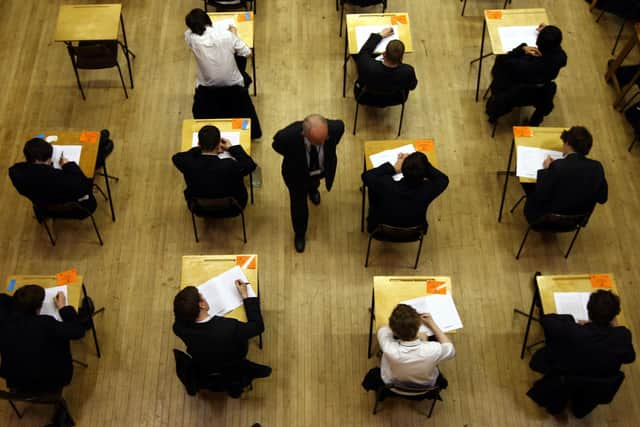Scottish exam results will be 'manipulated' to ensure more students fail, experts claim
The warning, from James McEnaney, lecturer and author of Class Rules: The Truth about Scottish Schools, comes ahead of the publication of the 2022 exam results by the SQA on Tuesday.
It will be the first year since the pandemic that saw pupils sit a full, traditional exams diet.
Advertisement
Hide AdAdvertisement
Hide AdEarlier this year, the SQA said it expected results of the 2022 exams to be an “intermediary position” between the results of last year and pre-pandemic.
The exams authority also said it would be “more generous in our approach” to grading to factor in the significant disruption to teaching caused by the pandemic and the Omicron variant.
Mr McEnaney said: “This means that results will be manipulated to ensure that the final picture is better than 2019, but worse than last year.”
In 2021, the attainment gap between the least deprived and the most deprived pupils dropped to just eight percentage points compared to 17 in 2019.
"We're now going to undo that progress, ”Mr McEnaney said.


"Put simply, the Scottish Government and SQA have decided to make sure that more students fail. They've decided that the gap between rich and poor must be widened.
"In doing so, they have admitted something fundamental – that a large part of so-called ‘attainment gap’ is just a choice that is made each year by politicians and bureaucrats.”
The author predicted that if the SQA had simply picked the mid-point between the 2021 and 2019 results as a benchmark, the attainment gap in 2022 should increase to around 12 points.
This would see a pass rate of around 74 per cent for the most deprived pupils and 86 per cent for the least deprived.
Advertisement
Hide AdAdvertisement
Hide AdMr McEnaney said the decision to ensure results would be an “intermediary position” in 2022 was due to the need for a “balancing act” to avoid restoring the gap between the richest and poorest in one fell swoop, something he labelled would likely be “politically problematic”.
He said: “How many (mostly poor) pupils can be sacrificed this year, and how quickly can we race back to an unjust status quo, before people become angry about it?
“Given that students this year faced at least as much Covid disruption as the previous year, and when alternative approaches were clearly available, this all seems to me to be incredibly callous and a clear betrayal of young people. But given the contempt with which they were treated in 2020 and 2021, that is, sadly, not really a surprise.”
Another leading education expert, Professor Lindsay Paterson, said the trend in the key metric of the overall pass rate could reignite questions about the effectiveness of teaching and of the Scottish curriculum.
The professor in education policy also warned the Government risked controversy over the arbitrary changes in pass rates.
He said: “In the past two years, the focus understandably was on how to be fair to the students who were being assessed then.
"But, having done that, how do we avoid unfairness to students who are assessed now?”
Prof Paterson warned that a return to lower pass rates when compared to 2019 figures could also revive a debate about the quality of the curriculum, reigniting the question of whether the type of assessment should be “changed fundamentally”.
Advertisement
Hide AdAdvertisement
Hide AdPass rates had fallen year-on-year for four years prior to the pandemic, meaning another fall could demonstrate “that the new curriculum has not been preparing students as well as the previous curriculum for the more demanding tasks of Higher”.
Highlighting the significant loss of schooling for those during the pandemic, a loss of around a two to three months of work since March 2020, the education expert said a failure to see a drop in pass rates when compared to 2019 could raise questions about the effectiveness of schools.
Prof Paterson said: “Standing back from all this, we might ask the question; if the pass rates don’t fall this year compared to 2019, despite all the Covid-related disruption to schooling, then what is the point of schools and teachers?
"The students on the cusp of a pass or fail will have been most damaged by that loss.
"So if, despite this, there is no fall in pass rates, what would that tell us about the effectiveness of schools in normal times?”
A spokesperson for SQA said: “These comments do a disservice to the thousands of teachers involved in the marking and grading of exams and are out of step with the Scottish education community, which came together to support learners and ensure assessment was fair.
“Our shared focus is on the achievements of the 138,000 learners who are set to receive their certificates on Tuesday.”
Education Secretary Shirley-Anne Somerville said: “To say that any government or any agency would set out to make more young people fail is utterly ludicrous.
Advertisement
Hide AdAdvertisement
Hide Ad“To rubbish results in this way is an insult to the young people who have worked so hard under really difficult circumstances. It also does a disservice to the teachers and lecturers who have supported them, many of whom have - as they do every year - worked with the SQA to ensure a credible assessment process and a credible set of results, from the setting of exam questions to marking and meetings to discuss grade boundaries.
“The SQA have moved back to exams this year, but in recognition that this is not a normal year, they have taken issues including disruption to learning and teaching into account when determining grades. That ensures a fair and credible system.”
The third episode of the brand new limited series podcast, How to be an independent country: Scotland’s Choices, is out now.
It is available wherever you get your podcasts, including Apple Podcasts and Spotify.
Comments
Want to join the conversation? Please or to comment on this article.
